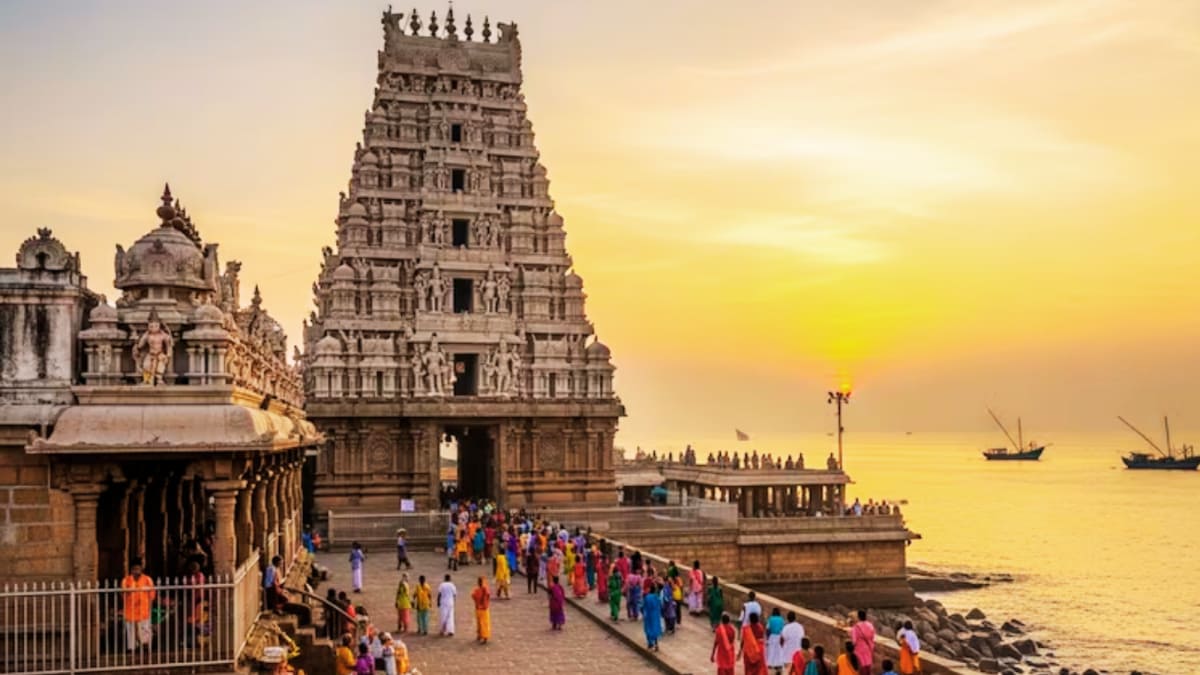Why Is Non-Veg Food Not Banned Around South Indian Temples | Explained

Last Updated:July 24, 2025, 11:49 IST
Unlike in North India, South Indian temples often coexist with nearby non-vegetarian shops, reflecting on local culture, livelihood, and a more inclusive view of religion
In temple towns like Rameswaram and Srisailam, non-vegetarian shops support local livelihoods and reflect cultural norms, making their removal both impractical and unethical. (AI Generated/ News18 Hindi)
In contrast to North India, where food near sacred sites is often policed for purity, South India offers a more pragmatic and inclusive approach to dietary diversity, even around revered Hindu temples.
Food And Faith: A Cultural Distinction
While religious devotion runs deep in South India, food choices are largely viewed as personal or economic, rather than moral. Unlike in North India, where vegetarianism is closely linked with religious observance, South Indian traditions often separate ritual purity within temple spaces from dietary habits outside.
Communities such as Nairs, Reddys, Vokkaligas, Thevars, and even some Brahmins in Kerala and Bengal have long included meat and fish in their diets. Non-vegetarianism here is part of cultural identity rather than a mark of religious impurity.
Temple Management And Social Influence
Another key difference lies in how temples are administered. In North India, many temples are overseen by politically or socially driven organisations, which often promote strict vegetarianism. In the South, however, temples are typically run by Devasthanam boards or mathas (monasteries) that reflect a broader cross-section of local communities, making rigid dietary enforcement uncommon.
The influence of the Dravidian movement, Ambedkarite thought, and regional politics has further contributed to a more inclusive, less polarised religious atmosphere. As a result, dietary restrictions are not imposed on the surrounding public.
Livelihood And Local Realities
In temple towns like Rameswaram in Tamil Nadu and Srisailam in Andhra Pradesh, local communities, particularly fishermen, depend on non-vegetarian food sales for their livelihood. Expecting the removal of such shops in these areas is not only impractical but morally questionable. Coastal abundance and ancient Dravidian culinary traditions have normalised the presence of fish and meat in these regions.
Many rural and folk traditions in South India, including certain Shaivite and Shakta rituals, even incorporate meat offerings. Therefore, meat shops near temples do not spark widespread opposition.
Different Notions Of Purity And Worship
South Indian religiosity often emphasises bhakti (devotion), inward spirituality, and inclusive practice rather than controlling the behaviour of others. This enables a more tolerant environment, where dietary habits coexist with deep religious faith.
Even historically, South Indian rulers such as the Cholas and Pandyas, known for their temple patronage, were meat-eaters, further cementing the cultural normalisation of non-vegetarian diets alongside religious devotion.
Vegetarianism: A Regional Divide
Statistically, the percentage of vegetarians is far higher in states like Gujarat, Haryana, Punjab, and Rajasthan. In contrast, the majority of people in Andhra Pradesh, Tamil Nadu, Kerala, Karnataka, and Telangana regularly consume non-vegetarian food, with only a small percentage identifying as strictly vegetarian.
Temples With Nearby Non-Vegetarian Food Outlets
Despite the sacred nature of the following temples, non-vegetarian restaurants are found close by:
- Rameswaram, Ramanathapuram (Tamil Nadu): A Jyotirlinga shrine surrounded by seafood restaurants supporting the local fishing community.
- Meenakshi Temple, Madurai (Tamil Nadu): Located in a vibrant part of the city with mutton biryani shops nearby.
- Chidambaram Nataraja Temple (Tamil Nadu): Surrounded by both vegetarian and non-vegetarian eateries.
- Arunachaleshwar Temple, Tiruvannamalai (Tamil Nadu): Non-veg food is common in surrounding hotels.
- Srisailam, Kurnool (Andhra Pradesh): Non-vegetarian dishes are sold in the outer complex, while the inner temple area remains strictly vegetarian.
One exception is Tirupati Balaji, Tirumala in Andhra Pradesh, where non-vegetarian food is strictly prohibited near the temple, though it is available in the lower town of Tirupati.
view comments
- First Published:
[title_words_as_hashtags




